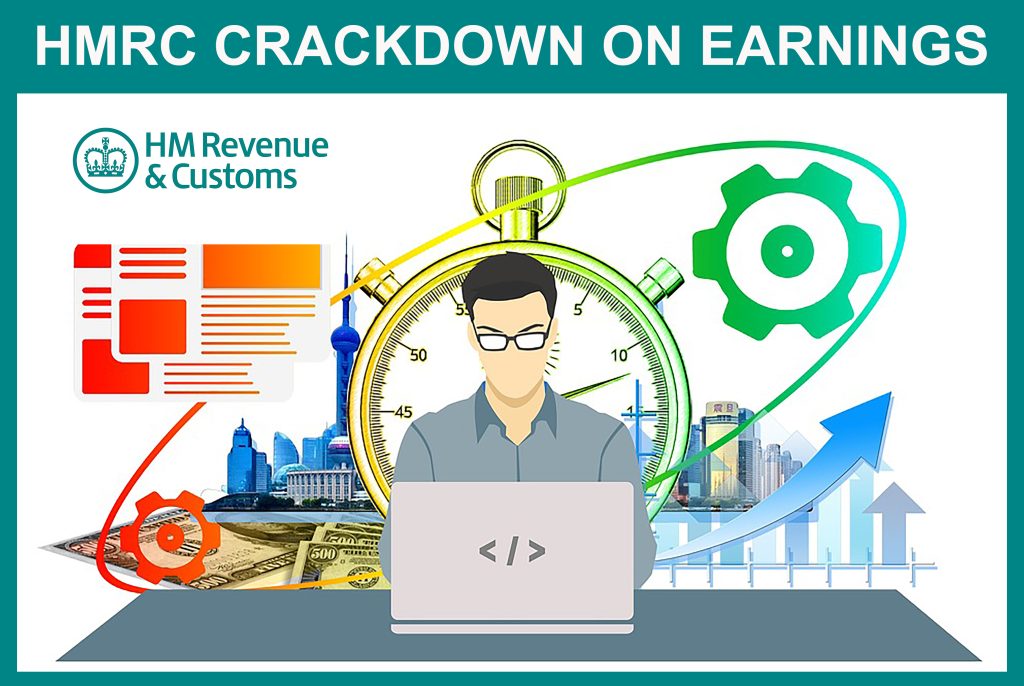
HMRC Issues ‘Crackdown On Earnings’ Warning to Millions in the UK from January 1
Millions of people across the United Kingdom will need to pay closer attention to their earnings from digital platforms. Her Majesty’s Revenue and Customs (HMRC) is set to implement a significant policy change, which involves instructing digital platforms to record and report the income generated by individuals selling their services on these platforms. This initiative is being hailed as a ‘crackdown’ on underreported income, as it seeks to ensure that everyone pays their fair share of taxes.
The Background
The gig economy has expanded rapidly in recent years, with an increasing number of people offering their services on digital platforms. From ride-sharing to freelance writing, these platforms have provided opportunities for millions to earn an income outside of traditional employment. However, the challenge for tax authorities, including HMRC, has been to track and collect taxes on these earnings effectively.
To address this issue, HMRC has taken a significant step by making digital platforms responsible for reporting the income of their users, much like traditional employers report earnings for their employees.
How It Works
Starting from January 1, 2023, digital platforms will be required to record the income earned by users selling their services on their platforms and report this information to HMRC. This income reporting will encompass a wide range of services, including but not limited to ride-sharing, short-term rentals, freelance work, and the sale of goods on online marketplaces. Users of these platforms will also be informed of the income reported to HMRC, ensuring transparency in the process.
Implications for Digital Platform Users
For individuals who earn income through digital platforms, this change means more scrutiny of their earnings. It’s crucial to understand that this is not an attempt to curtail legitimate income generation but rather an effort to ensure that taxes are paid correctly.
- Increased Tax Compliance: This policy change aims to boost tax compliance by reducing the opportunity for underreporting or tax evasion. Digital platform users will need to keep accurate records of their income and expenses to ensure they pay the right amount of taxes.
- Potential for Tax Deductions: While you will be required to report your earnings, you may also have the opportunity to claim tax deductions on expenses related to your work on digital platforms. These deductions can help reduce your overall tax liability.
- More Clarity: With digital platforms sharing income data with HMRC and users, there will be greater transparency. This could lead to a better understanding of tax liabilities and help prevent unintentional tax evasion.
Implications for Digital Platforms
For digital platforms, this change requires a significant shift in their reporting and compliance mechanisms. Here’s what they can expect:
- Data Collection and Reporting: Digital platforms will need to develop systems that can accurately record and report user earnings. This will require coordination with users to ensure that income data is accurately reflected.
- Increased Responsibility: These platforms will now have a higher level of responsibility concerning tax compliance and will need to cooperate with HMRC. Failure to do so could lead to penalties and fines.
- Possible Changes in Business Models: To adapt to these new regulations, digital platforms may need to make changes in their fee structures or policies to ensure that users can comply with tax reporting requirements.
Who Is HMRC Targeting?
HMRC, the UK’s tax authority, is targeting individuals and businesses who earn income by selling their services or products through digital platforms. This includes a wide range of service providers and sellers who use online platforms to generate income. The initiative aims to ensure that everyone involved in the gig economy or online marketplace economy pays their fair share of taxes.
The targets of this crackdown primarily include:
- Ride-sharing and Delivery Drivers: Uber, Lyft, food delivery drivers, and other ride-sharing or delivery service providers.
- Short-term Rental Hosts: Individuals who rent out their properties or rooms through platforms like Airbnb.
- Freelancers and Gig Workers: Those who offer their services on platforms like Upwork, Fiverr, or TaskRabbit.
- Online Sellers: Individuals and businesses who sell products through e-commerce marketplaces like Amazon, eBay, or Etsy.
- Service Providers: People who offer services through online marketplaces, such as dog walking, home cleaning, tutoring, and more.
- Digital Content Creators: Content creators on platforms like YouTube, Twitch, and Patreon earn income through advertising, sponsorships, and viewer contributions.
- Domain Sellers: Domain traders that do not declare their income from marketplaces and via escrow.
- Affiliate Marketing: Affiliate marketers whom earn commissions on the traffic they generate for advertisers based on the click per action (CPA).
The HMRC’s focus is to collect accurate tax information from these individuals and businesses to ensure that they are paying the correct amount of taxes on their earnings. The goal is to reduce tax evasion and underreporting of income within the digital platform economy. This initiative promotes fairness in the tax system and ensures that the government collects the revenue necessary to fund public services and infrastructure.
Businesses That Have Multiple Brands
Businesses with multiple brands that operate through digital platforms will also be affected by the HMRC’s crackdown on income reporting. While the new regulations mainly target individual users and sellers on these platforms, the businesses that own or manage these brands need to ensure compliance and take several steps to navigate these changes effectively:
- Clarify Tax Responsibilities: Businesses with multiple brands must clearly define the tax responsibilities of their brand users and sellers. This includes informing them of the new reporting requirements and cooperating with them to ensure accurate income reporting.
- Update Terms and Conditions: Review and, if necessary, update the terms and conditions for your brand users and sellers. Ensure that they are aware of their obligations to report their income accurately to HMRC and may need to share income information with the parent company.
- Educate Brand Users and Sellers: Provide educational resources and guidance to brand users and sellers about the new regulations. This could include information on record-keeping, potential deductions, and legal obligations.
- Coordinate with Digital Platforms: Collaborate with the digital platforms that host your brands to ensure they have systems in place for accurate income reporting. Work closely with the platforms to understand their reporting processes and facilitate smooth compliance.
- Internal Record Keeping: Maintain comprehensive records of income earned by each brand under your business umbrella. Ensure that your financial and accounting departments have systems in place to manage and report this information accurately.
- Tax Deductions: Help brand users and sellers understand potential tax deductions they may be eligible for, such as expenses related to their work or business costs. This can reduce their overall tax liability.
- Engage with HMRC: Establish a cooperative relationship with HMRC. If HMRC has any questions or concerns regarding income reporting from your brands, be prepared to provide the necessary information and cooperate fully.
- Legal and Financial Advice: Consider seeking legal and financial advice to ensure that your business is in full compliance with the new regulations. Legal and financial experts can help you navigate any complex tax issues.
- Adjust Business Models: If necessary, assess whether any adjustments to your business models, fee structures, or contractual agreements with brand users and sellers are needed to facilitate compliance with the new regulations.
- Stay Informed: Keep your business updated on any changes in tax regulations and compliance requirements. The tax landscape can evolve, and staying informed is crucial to maintaining compliance.
Businesses with multiple brands should take a proactive approach to ensure compliance with the HMRC’s regulations and work alongside their brand users and sellers to facilitate accurate income reporting. By doing so, they can maintain a transparent and cooperative relationship with tax authorities while preserving the integrity of their brands and business operations.
Conclusion
The HMRC’s ‘crackdown’ on earnings from digital platforms is a significant move towards a fairer and more equitable tax system in the UK. It is designed to close the tax gap and ensure that everyone pays their share of taxes, thus funding essential public services.
Digital platform users should be prepared to provide accurate financial information and take advantage of potential deductions, while digital platforms must adapt to new reporting responsibilities. As we move into 2023, this policy change will impact millions of people and businesses, bringing about increased transparency and accountability in the gig economy.
#hmrc #taxevasion #selfassessment #declaringincome #fiverr #upwork #uber #airbnb #domainsellers #freelancers #freelancer #gigs #ebay #pintrest #tiktok #instagram #facebook
Further Reading
- HMRC issues ‘crackdown’ warning to millions in UK from January 1 – Wales Online
- HMRC to launch major ‘crackdown’ on millions of UK taxpayers from January 1 – Mirror Online
- Tax crackdown on side hustles to ‘impact millions’ of workers and freelancers | Personal Finance | Finance | Express.co.uk
ADVERTISEMENTS



Andrew Jones stands as a veteran journalist celebrated for his profound expertise in the realms of current affairs, politics, and health reporting. With an illustrious career spanning over two decades, he has firmly established himself as a trusted and authoritative voice in the field, consistently delivering astute analysis and thought-provoking commentary on some of the most pivotal issues of our time.
From an early age, Andrew's fervor for journalism was unmistakable, and he pursued this calling with unwavering commitment. He meticulously honed his skills and deepened his knowledge through rigorous education and hands-on experiences, solidifying his status as the go-to source for news outlets seeking comprehensive and meticulously researched articles.
Throughout his journey, Andrew has contributed significantly to distinguished newspapers and magazines, leaving an indelible imprint on the media landscape. His work has graced the pages of renowned publications, including the prestigious Cymru Marketing Journal (CMJUK), where he consistently delivered thought-provoking pieces that resonated with readers and ignited substantive conversations.
Andrew's reporting style is characterized by an unwavering dedication to impartial, fact-based journalism. He ardently strives to furnish readers with a well-rounded and comprehensive perspective on intricate issues, acting as a guiding light in navigating the complex worlds of current affairs, politics, and health, rendering them more transparent and understandable.












